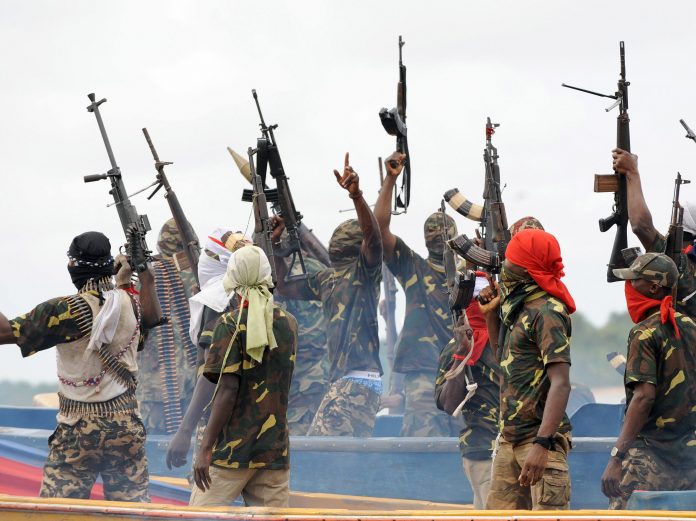
The Gulf of Guinea stretches from Angola to Senegal and is divided into 6 zones – Zone A to Zone F. It is made up of 16 coastal countries: Angola, Equatorial Guinea, Gabon, Cameroon, Nigeria, Benin, Togo, Ghana, Ivory Coast, Liberia, Sao Tome and Principe, Congo, Senegal, the Gambia and Guinea. Ghana falls into Zone F, which stretches from Ghana to Guinea.
The Gulf of Guinea is a major shipping route for transportation of oil and gas and other goods between Central Africa and Southern Africa, and West Africa and the rest of the world. According to the European Union’s maritime factsheet, about 1,500 fishing ships, cargo ships, tankers and other vessels navigate the Gulf of Guinea’s waters daily.
Some piracy in the region has been occurring for about a decade. Piracy activities include armed robbery, kidnapping seafarers and hijacking ships. Piracy in the Gulf of Guinea is violent because the pirates are usually heavily-armed.
According to the Year 2020 In Review – Gulf of Guinea Maritime Situation by the Multinational Maritime Coordination Centre (MMCC) Zone F, a total of 139 piracy incidents occurred as compared to 128 in 2019. The kidnapping incidents among these attacks contributed to 95% of all kidnapping at sea, according to the International Maritime Bureau. By May 2021, 23 incidents were recorded – which included the kidnapping of 13 Turkish seafarers.
According to the Multinational Maritime Coordination Centre (MMCC), the high number of incidents in the year 2020 can be attributed to the COVID-19 pandemic. Due to the pandemic, there were delays in mandatory vessel crew changes due to the travel restrictions; and this caused the seafarers to be tired and reduced their diligence, which made it easier for the criminals to attack.
In addition, the security focus shifted as more attention was given to handling the virus – at the expense of other security sectors. Maritime security was greatly affected. The high rate of unemployment and lacking implementation of maritime laws also contribute to the high number of piracy incidents.
Piracy poses a major treat to trade as it causes an increase in cost due to the price of insurance. It also deters foreign investors as the region is regarded as unsafe, and also the lives of seafarers aboard the ships are at risk. In some extreme piracy incidents, seafarers have lost their lives.
In his opening remarks at the Gulf of Guinea Maritime Collaboration Forum, Kitack Lim – the Secretary-General of the International Maritime Organisation noted: “The security situation in the Gulf of Guinea remains atop the IMO’s and my own personal priorities. International shipping is suffering. Piracy and armed robbery continue to damage the economy and trade”. It was reported by the United Nations Office of Drugs and Crime (UNODC) that West Africa lost approximately US$2.3billion between 2015 and 2017 due to piracy.
In 2013, 25 countries from Central and West Africa signed the Yaounde Code of Conduct to tackle piracy and other crimes in the Gulf of Guinea. The Code of Conduct t provides the structure for joint operations, intelligence sharing and harmonised legal frameworks.
In order to implement this code two regional bodies were created: The Regional Centre for Maritime Security in Central Africa (CRESMAC) and the Regional Coordination Centre for Maritime Security in West Africa (CRESMAO), assisted by countries of the Economic Community of Central African States (ECCAS) and Economic Community of West African States (ECOWAS) respectively.
In 2021, the increasing number of piracy incidents caused stakeholders to come together and draft the Gulf of Guinea Declaration on Suppression of Piracy, which has been signed by 349 stakeholders from all over the world.
Some signatories are the A.P. Moller-Maersk from Denmark, Amoretti Armatori Group from Italy and BREB GmbH & Co KG from Germany. The signatories to the declaration demand that “no seafarer should face the grave risks of kidnapping and violence when transporting cargo, supporting the offshore sector, or fishing in the Gulf of Guinea”.
The aim of this declaration is to decrease the piracy activities by 80 percent by 2023. In 2019 Nigeria also the established the Deep Blue Eye project to counter terrorism. ECOWAS also launched the Integrated Maritime Strategy which focuses on inter-agency collaboration at the national level. Some stakeholders in this strategy include development partners like the European Union, Denmark and Germany, port authorities, law enforcement agencies, regional defence and security, and civil societies.
Several initiatives have been established to counter piracy in the region, and these if duly implemented will reduce piracy incidents. There have been success stories in the fight against piracy in other regions of the African continent. Until 2012, the Gulf of Aden which is offshore Somalia was a hotspot for piracy.
However, interventions from international communities helped to drastically reduce piracy activities; and by 2017 no major piracy incident was recorded. It is our hope that the Gulf of Guinea will also have a success story.
Kandifo Institute-suggested policies
- States in the region should invest greatly in counter-piracy and focus more on maritime security.
- States should be keen about implementing the codes of conduct and other initiatives set out to counter piracy.
- International communities should also be involved and play roles in countering piracy, as it equally affects them.
>>>The writer is the Executive Director, Kandifo Institute. He can be reached on [email protected]









